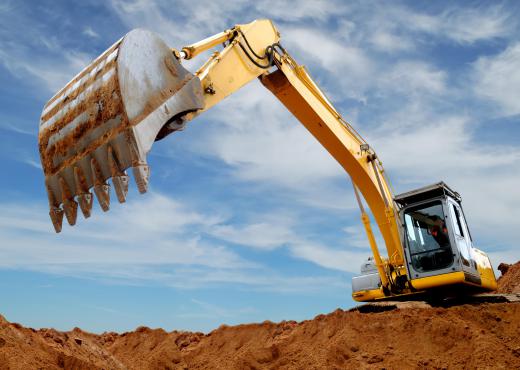A 360 excavator is an excavator that is able to pivot a full 360 degrees on its tracked base. An excavator is a large, typically tracked machine, that uses a bucket attached to a long boom and pick assembly to reach deep into the earth to dig trenches and holes. Some smaller excavators are only able to swing the boom and pick, since the main body of the machine is permanently mounted to the track chassis. Larger, 360 excavator designs have the boom and pick fastened to the body rigidly, so the body must be allowed to rotate on a center pin to allow the bucket to empty and dig in separate locations.
The common heavy machine seen on most job sites is a 360 excavator able to pivot all the way around the base. This allows the operator to dig earth in one location and swing the excavator around to empty the dirt in a waiting dump truck or onto a pile. With some of the smaller rental excavators, the shovel, boom and pick operate much like a backhoe on a tractor. This type of machine is only able to swing the bucket a few degrees each way from center to empty the bucket or to dig.

One major advantage in having a 360 excavator on a construction site is the ability to dig on one side of the machine and load a waiting dump truck on the other side. The operator simply digs a bucket full of material and swings the entire cab and boom 180 degrees to unload the bucket into a truck. The operator is also able to unload and begin a pile off to one side of the 360 excavator, so that the materials can be loaded into a truck or placed back into the hole at a later time. This movement also makes it possible for the 360 excavator to unload materials from trucks and trains with the addition of a mechanical thumb fitted onto the bucket.
Another benefit of the 360 excavator is the ability to work while positioned sideways on the tracks. This is often a better method of balancing and stabilizing the 360 excavator on soft or unstable ground. When digging a ditch, the 360 excavator is able to position the tracks so that the machine is able to drive along the side of the road. With the cab and bucket positioned 90 degrees to the side of the tracks, the operator is able to dig continuously while the tracks carry the excavator down the ditch line.
